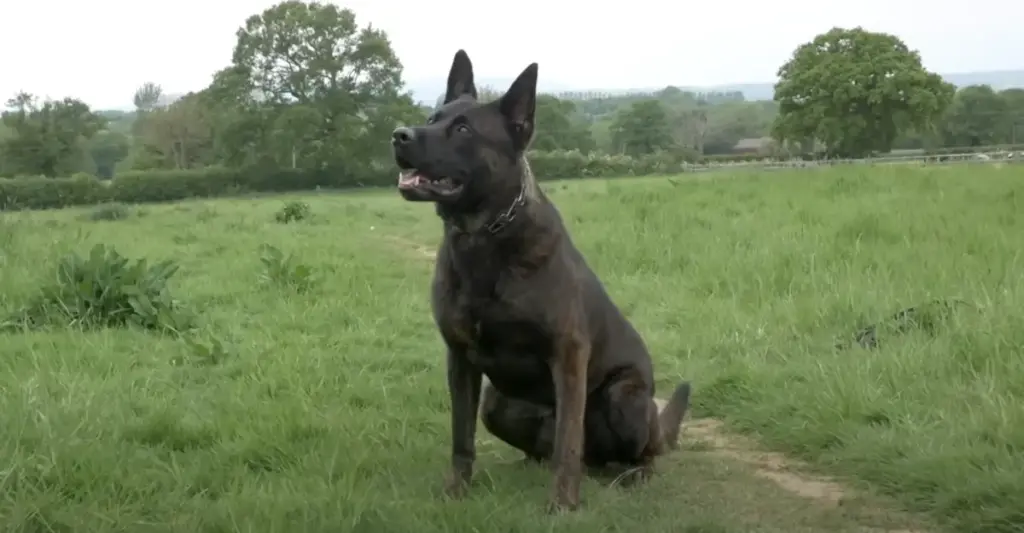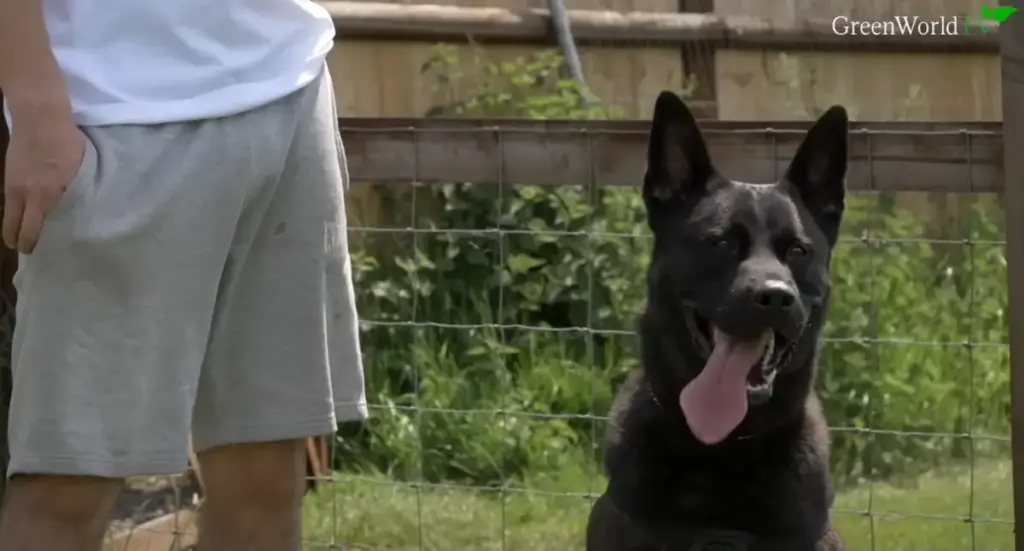Imagine standing in the vibrant tulip fields of the Netherlands, where amidst the explosion of colors, a keen-eyed Dutch Shepherd moves with purpose, herding with precision and grace. You’ve likely seen this breed’s silhouette, poised and alert, but there’s more to the Dutch Shepherd than meets the eye.
As a herding aficionado, you know these dogs aren’t just workers; they’re intelligent companions, known for their versatility and adaptability in work and home environments. They’re as agile in mind as they are in body, requiring engagement beyond the average game of fetch. If you’re considering bringing one into your life, it’s essential to understand their exercise needs, potential health issues, and training strategies to ensure a harmonious relationship.
Join us as we explore the multifaceted nature of the Dutch Shepherd, and discover whether this enduring breed is the perfect fit for your lifestyle.
- Noise Level
- Energy
- Sociability
- Trainability
- Care
- Health
Overall
Summary
The Dutch Shepherd breed is known for its moderate noise level, high energy, sociable nature, excellent trainability, moderate care needs, and good overall health.
Dutch Shepherd: Traits, Temperament, and Care Guide
Dutch Shepherds are renowned for their sharp intellect and steadfast loyalty, which make them ideal for various roles, from police work to faithful family companionship. Highly intelligent, they thrive on exercise and mental stimulation.
With three coat varieties, they require regular grooming. While generally healthy, watch for genetic health problems.
Perfect for active people, they excel in dog sports, embodying the quintessential working dog temperament.
Exploring the Characteristics of the Dutch Shepherd
What sets the Dutch Shepherd apart in the canine world are its versatile characteristics, which include a strong work ethic, a resilient nature, and a striking brindle coat that often captivates onlookers.
| Coat Variety | Description |
|---|---|
| Short Hair | Practical for maintenance, less prone to tangling. |
| Long Hair | Requires regular grooming, prone to matting. |
| Wire Haired | Distinctive rough texture, offers a rustic appearance. |
Dutch Shepherds’ coat color is typically a captivating brindle.
Dutch Shepherd: A Comprehensive Profile and Guide
As you consider the Dutch Shepherd for your next canine companion, it’s essential to grasp their comprehensive profile. This guide will equip you with the critical knowledge of their origins, physical characteristics, and temperament, ensuring you make an informed decision.
You’ll learn about their health considerations, exercise requirements, and training strategies for maintaining their well-being and harnessing their natural abilities.
Everything You Need to Know
Embarking on the journey to understand the Dutch Shepherd, you’ll discover a breed whose origins in the Netherlands have shaped a versatile and intelligent canine companion. It requires a dedicated and active owner to match its high energy and exercise needs.
- Breed standard includes three varieties of coat: short, medium, and long.
- Regular grooming helps remove loose hair, maintaining a healthy coat in shades of gold and silver.
- Highly trainable for police and military work; thrives with regular, rigorous exercise.
Discovering the Temperament of Dutch Shepherd
Dutch Shepherds typically exhibit an intelligent and alert temperament, making them exceptional companions for active families or individuals. As family pets, they’re highly trainable, requiring regular, daily exercise to match their activity level.
Their intelligence facilitates a strong bond, ideal for police and military roles. With consistent training, these dogs demonstrate loyalty and a protective instinct, yet remain playful and affectionate with their human counterparts.

Dutch Shepherd: Is It a Good Fit for Families?
The Dutch Shepherd might be an amiable addition to your family, as its loyal and affectionate demeanor complements family life well.
However, matching their high exercise requirements and herding instincts with an active lifestyle and vigilant supervision is crucial, especially around children.
Prioritizing consistent training and acknowledging the breed’s health predispositions are essential steps in integrating a Dutch Shepherd into your household.
Assessing Dutch Shepherd’s Compatibility with Families and Kids
When considering a Dutch Shepherd for your family, it’s essential to recognize that their need for regular exercise and mental engagement aligns well with the dynamic lifestyle of an active household with children.
Dutch Shepherds form strong bonds, making them a great fit for families. They remain calm around kids, provided they’re well-socialized. This breed needs a lot of exercise, ideal for keeping up with energetic children.
Dutch Shepherd Flexibility
How does the remarkable flexibility of a Dutch Shepherd benefit their physical and mental well-being?
The trainability and flexibility intrinsic to the Dutch Shepherd, including all three varieties—shorthaired, rough-haired, and wire-haired Dutch—enhance their herding capability. Adaptable to learning new commands, these dogs demonstrate a synergy of skills.
Their flexibility fosters an active lifestyle, which is crucial for physiological health and cognitive sharpness, ensuring a robust, balanced life.
Dutch Shepherd Obedience Tips
You must employ consistent and firm training methods to harness the Dutch Shepherd’s strong-willed nature.
Initiate early socialization to ensure your Dutch Shepherd remains composed around unfamiliar pets and individuals.
Select training techniques that challenge their high intelligence.
Provide ample exercise to avert boredom-induced destructive behaviors.
Effective Training Strategies
Harnessing the Dutch Shepherd’s intelligence and loyalty requires consistent and firm training, tailored to engage their sharp minds and gain their trust. Effective training strategies involve positive reinforcement, highlighting the breed’s aptitude for obedience.
| Early Socialization | Mental Stimulation | Positive Reinforcement |
|---|---|---|
| Calm around others | Prevents boredom | Enhances responsiveness |
| Builds confidence | Encourages learning | Strengthens bond |
| Essential for pups | Fosters obedience | Ideal for Dutch Shepherds |
With the right approach, your Dutch Shepherd can excel in dog training, police work, search and rescue, or even as guide dogs.

Dutch Shepherd Exercise and Grooming Needs
To meet their high exercise demands, Dutch Shepherds require daily physical activities, such as walks and jogs, and mental challenges to stay fit and content. Daily walks are essential, as is engaging in activities that satisfy their herding instincts.
For grooming, weekly sessions help remove loose hair, especially from their woolly undercoat. The coat, harsh to the touch, comes in three varieties and benefits from more thorough grooming in spring and fall.
Health Considerations
When considering a Dutch Shepherd’s health, it’s vital to recognize their susceptibility to certain conditions. These include hip and elbow dysplasia, as well as specific eye issues.
You’ll find that careful breeding practices and consistent veterinary care are critical in mitigating the risks of inheritable diseases.
Common Health Issues and Lifespan
Dutch Shepherds typically enjoy a robust lifespan of 12-14 years, but they’re susceptible to health issues such as hip and elbow dysplasia and certain eye conditions. As a rare breed, they exemplify fewer instances of hip dysplasia than other dog breeds.
Diligent care, including grooming to remove loose and dead hair, supports their well-being. Remember, regular veterinary oversight is paramount to effectively mitigate these common health issues.
Is Dutch Shepherd the Right Pet for You?
Considering the Dutch Shepherd’s high intelligence and need for regular activity, you should evaluate whether your lifestyle can accommodate the breed’s exercise and training requirements before deciding if they’re the right pet for you.
They make excellent companions but aren’t the best dog to be left alone for long periods.
Regular grooming is needed to remove loose and excess hair.
If the Dutch Shepherd is still a consideration at eight weeks, you’ll need to use this time for socialization and bonding.
Alternatives for Dutch Shepherd: Versatile and Intelligent Medium-Sized Herding Breeds
Explore these breeds if you appreciate the Dutch Shepherd’s versatility and intelligence, ideal for those who value adaptable and smart medium-sized herding dogs.
| Similar Dogs | Short Description |
|---|---|
| Belgian Malinois | Highly trainable and active, often used in demanding roles like police work. |
| German Shepherd | Highly intelligent and versatile, known for its protection and working abilities. |
| Australian Shepherd | Versatile and energetic, great for herding and dog sports. |
| Border Collie | Highly intelligent and athletic, excellent for herding and agility sports. |
| Collie | Famous for intelligence and grace, great family companion. |
Conclusion
So, you’ve devoured our Dutch Shepherd dossier and are now an armchair expert on these canine Einsteins with a penchant for action. Ready to trade your couch for a flurry of fur and non-stop fetch sessions? If you’re nodding enthusiastically, perhaps you’re cut out for the exhilarating ride of Shepherd stewardship.
Remember, opting for this brindle buddy is less about pet ownership and more about embracing a whirlwind of perpetual motion and boundless brains. Choose wisely, future Dutch Shepherd dynamos!
Frequently Asked Questions
Why Are Dutch Shepherds so Rare?
You’re witnessing Shepherd scarcity due to breeding challenges and niche popularity. Working versatility can’t offset rarity factors like genetic bottlenecks and limited geographic distribution. Preservation efforts hinge on market demand and adoption rates.
What Breeds Make up a Dutch Shepherd?
You’re delving into shepherd origins; Dutch Shepherds are a blend of herding breeds from the Netherlands, with traits like varied coat types, notable temperament, and high exercise needs shaping their historical herding duties.
Does AKC Recognize Dutch Shepherds?
Yes, the AKC recognizes Dutch Shepherds, allowing them to participate in herding and performance events. However, they’re listed under AKC’s Foundation Stock Service, not the main registry, offering breed clubs and alternative registry options.
What Is the Breed Standard for a Dutch Shepherd?
The Dutch Shepherd standard includes specific size specifications, coat varieties, and a lifespan expectancy of 12-14 years. It emphasizes their temperament, exercise needs, and the importance of health screening and socialization.
